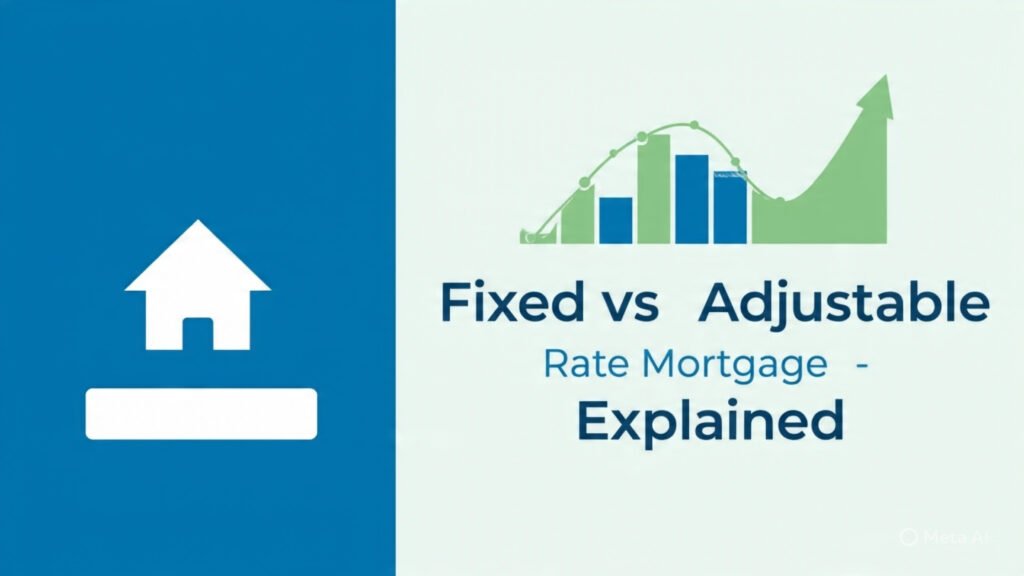Introduction
When choosing a mortgage, one of the most important decisions is whether to go with a fixed-rate mortgage or an adjustable-rate mortgage (ARM). Both options affect your monthly payments, long-term costs, and financial flexibility. Understanding the difference between these two mortgage types helps you make the right decision for your budget and homeownership goals.

1. What Is a Fixed-Rate Mortgage?
A fixed-rate mortgage is a loan where the interest rate remains the same for the entire life of the loan.
- Predictable payments: Monthly principal and interest do not change.
- Loan terms: Common options are 15, 20, or 30 years.
- Best for: Homebuyers who plan to stay in their home long-term and prefer financial stability.
2. What Is an Adjustable-Rate Mortgage (ARM)?
An adjustable-rate mortgage starts with a fixed interest rate for an initial period (e.g., 5, 7, or 10 years), then adjusts periodically based on market conditions.
- Initial savings: Lower starting interest rates than fixed loans.
- Adjustment period: After the intro period, rates may go up or down.
- Best for: Buyers planning to sell or refinance before the adjustment period begins.
3. Key Differences Between Fixed and Adjustable Rate Mortgages
| Feature | Fixed-Rate Mortgage | Adjustable-Rate Mortgage (ARM) |
|---|---|---|
| Interest Rate | Stays the same | Starts low, adjusts later |
| Monthly Payments | Predictable | May increase or decrease |
| Stability | High | Depends on market rates |
| Initial Cost | Higher than ARM | Lower than fixed |
| Best For | Long-term buyers | Short-term buyers/refinancers |
4. Pros and Cons of Fixed vs. Adjustable
✅ Fixed-Rate Mortgage
Pros:
- Stable, predictable payments
- Easier budgeting
- Protection from market rate hikes
Cons:
- Higher initial rates than ARMs
- Less flexibility if interest rates drop
✅ Adjustable-Rate Mortgage (ARM)
Pros:
- Lower initial payments
- Potential to save if you sell or refinance early
- May benefit if interest rates fall
Cons:
- Payments can rise significantly
- Harder to budget long-term
- Risk if you keep the loan past the adjustment period
5. Which One Should You Choose?
The choice depends on your financial goals and homeownership plans:
- Choose a fixed-rate mortgage if you want stability and plan to stay in the home for 10+ years.
- Choose an ARM if you want lower initial payments and expect to sell, refinance, or relocate within a few years.
💡 Tip: Always ask your lender for a Loan Estimate comparing both options.
FAQs – Difference Between Fixed and Adjustable Rate Mortgage
1. Which mortgage is safer – fixed or adjustable?
Fixed-rate mortgages are safer because payments remain constant. ARMs carry more risk due to potential rate increases.
2. Can I switch from an ARM to a fixed mortgage later?
Yes, you can refinance into a fixed-rate mortgage before the adjustment period.
3. Are ARMs good for first-time homebuyers?
They can be, but only if you plan to sell or refinance within a few years.
4. Do ARMs always increase after the fixed period?
Not always. Rates may go up, down, or remain stable depending on market conditions.
5. Which mortgage helps save more money long-term?
Fixed mortgages usually save more long-term, while ARMs may offer short-term savings.
Conclusion
The difference between fixed and adjustable rate mortgages comes down to stability vs. flexibility. Fixed-rate mortgages provide predictable payments, while ARMs offer lower initial costs but carry future uncertainty. The right choice depends on how long you plan to keep the home and your risk tolerance. Also, read about What Are Closing Costs in Home Purchase? – Complete Guide.
⚠️ Disclaimer: This article provides general information only. Mortgage terms vary by lender, market, and borrower profile. Always consult a mortgage advisor or financial expert before making decisions.